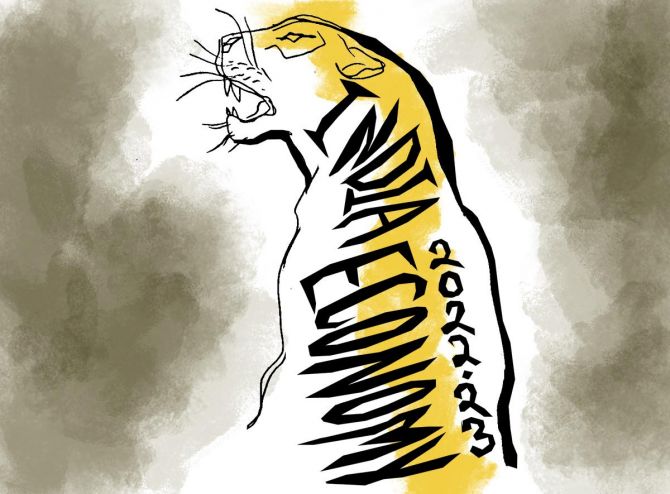'There will always be a challenge to maintain a fine balance to ensure that growth keeps happening and inflation is contained.'

Sanjiv Mehta, chairman and managing director, Hindustan Unilever, took charge of industry association FICCI when the Budget is weeks away.
Mehta tells Indivjal Dhasmana/Business Standard that inflation will start easing from the second half of 2022 as production ramps up.
The concluding segment of a two-part interview:
- Part I: 'What we need now is spending'
The Omicron scare along with taper by the US Federal Reserve led to a bloodbath in the stock markets last fortnight. Do you see capital flight away from the emerging market economies?
My assessment is you won't have the taper tantrum that happened in 2013.
Our position is far stronger when it comes to forex reserves.
You are talking of a $600 billion arsenal which is a pretty robust financial position we have.
At the end of the day, money moves where it sees better return on capital invested.
If India keeps growing, I don't think that money flow into the country will stop.
In fact, if you listen to the sound bites coming from many investment managers, they feel India will be one of very attractive markets.
They are going long on India. If you take multinationals like Unilever, we are very bullish on India.
India is one of the most important markets for Unilever globally.
While stock markets tanked, bond yields rose in anticipation that the RBI will raise rates. Do you think this will happen?
There will always be a challenge to maintain a fine balance to ensure that the growth keeps happening and inflation is contained.
That is what RBI will keep a tight watch on.
That will require monetary maneuvering. I believe RBI should be able to maneuver.
Since we have come to inflation, companies have been facing increased input pressures. They are passing some part of it to consumers. HUL has done it in some products. How do you see the inflation trajectory going forward?
For some commodities, inflation has been unprecedented.
If you take HUL's business, tea prices went up significantly over the last two years, especially last year.
But that is more a supply constraint.
Oil prices and derivatives like chemicals have gone up significantly.
When all three come together, you see a kind of inflation that you have not seen in many years.
Yes, inflation is there. But there is no one to one correlation between input price inflation and finished product prices because we always try to optimize different levels of business and then look at price increase.
And when we look at price increase we always try to ensure that the price value equation remains intact.
Consumers do not look at absolute prices alone. He looks at the price value.
So you have to ensure that price value, whether it is linked to product superiority, whether it is linked to relative price index remains intact.
Sebi banned new futures in six commodities. Will it be effective to control inflation in these commodities?
It is very difficult to say because a lot of inflation in commodities, whether it is palm oil, crude oil, is an international phenomenon.
Lot of inflation is coming from the supply side.
I believe that as production gets ramped up, as things start easing, maybe from the second half of 2022, you will see moderation of inflation.
Given that the government has repealed farm laws, do you see hindrances in further agri reforms by the government?
It is very difficult to say what the stance of the government is.
Agriculture has a very small share in GDP but employs 40 per cent of the workforce in the country and has a low single digit share in the global grains market.
If you look at the size of the land which is under cultivation, then potentially India could be a granary to the world.
It does require far better management of resources whether it is water or value chain from the farm.
Just take a small country like the Netherlands, it has $100 billion of exports of agri and horti products.
I think a vision for agriculture has to take into account the potential that the country has.
Agriculture should remain a key priority, going forward.
After protestors forced government hands on farm Acts, there are apprehensions that the government will also bend on labour codes and privatisation of two public sector banks. How do you see it?
As Ficci, we are pro-reforms. And we believe that the country has to move towards reforms.
Take GST for instance. A few years into it, teething problems have stabilised.
If you look at my business, we used to have 40 fulfillment centers, which we were able to reduce by 50 per cent.
You look at the tax collections. These very clearly indicate long term benefits of the structural reforms.
There has been much debate on crypto, whether it should be banned or regulated. What are your views on this?
I think we should at this stage leave it to the RBI to determine what is in the best interest of the country.
Feature Presentation: Aslam Hunani/Rediff.com











 © 2025
© 2025